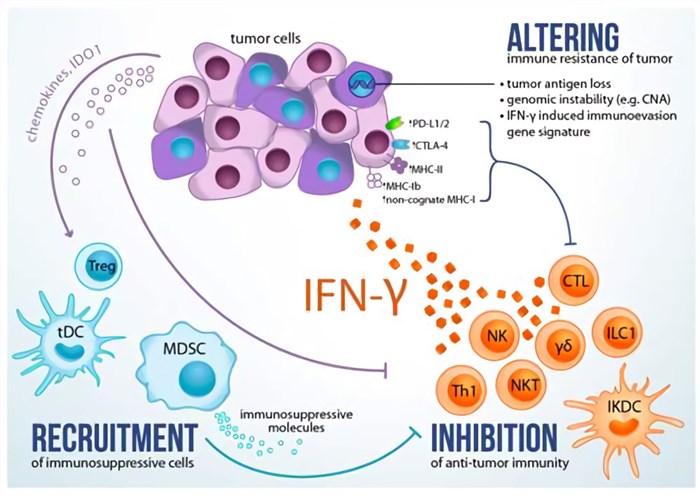Oncolytic Virus Combination Therapies-with Cytokines
Cytokines Therapy
In biotherapy, including cytokines, monoclonal antibodies, stem cell transplants, immune cells, and tumor vaccines, cytokines are the most widely used. The therapeutic effects of cytokines on many common, frequently-occurring, and infectious diseases in humans are unmatched by traditional therapies such as chemical drug therapy, radiotherapy, and surgical treatment. Cytokines are synthesized and secreted by immune cells and certain non-immune cells, and have the functions of mediating and regulating immunity and cell growth, hematopoiesis and inflammation. Cytokines are the general term for such highly active and versatile small molecule proteins: cytokines produced by phagocytes are called mononuclear factors, cytokines produced by lymphocytes are called lymphokines, and cytokines with chemotaxis are called chemokines, cytokines that can stimulate the differentiation and maturation of bone marrow stem cells or histiocytes are called colony-stimulating factors, and cytokines mainly produced by white blood cells and acting on white blood cells are called interleukins.
The use of recombinant cytokines as drugs for diseases is called cytokine therapy. When the body's immunological dysfunction is caused by the relative or absolute lack of certain cytokines in the body due to certain pathophysiological effects, the balance is restored by importing exogenous cytokines to regain the immunological function to achieve disease treatment purpose. There are dozens of clinical applications of recombinant cytokines produced by genetic engineering by far. The main cytokines in the clinical treatment of cancer are interferon, interleukin, and tumor necrosis factor, etc.
Combination Therapy of Oncolytic Virus with Cytokines
Preclinical studies on animal models have confirmed that combination therapy can improve the therapeutic response of oncolytic virus therapy alone. This strategy led to the combined use of oncolytic viruses with cytotoxic chemotherapy, targeted molecular drugs, and radiation therapy, as well as immunotherapy including cytokines, adoptive T cell therapy, and immune checkpoint inhibitors. Early clinical trials further validated the oncolytic virus-based combination strategy and reported an improved objective response rate and tolerable safety. In combination therapy of oncolytic viruses and cytokines, oncolytic viruses can often carry certain cytokine-expressed genes through genetic engineering. For example, granulocyte macrophage colony-stimulating factor, tumor necrosis factor-α or interferon. In this regard, the most studied types are vaccinia virus and adenovirus.
 Fig.1 Roles of cytokines in response to tumor cells.1
Fig.1 Roles of cytokines in response to tumor cells.1
Examples
Taking the combination therapy of vaccinia virus and cytokines as an example, which constructed a vaccinia virus capable of expressing macrophage inflammatory protein 3β (MIP-3β / ELC / CCL19) and injected it into a mouse tumor model. Study results showed that the virus strain can enhance the oncolytic effect of the virus, and it was found that this effect is related to the high expression of CCL19 at the tumor site to promote the enhancement of the infiltration ability of T cells and dendritic cells into the tumor site. Researches also found that the high expression of CCL10 in tumors does not extend the duration of the virus in the tumor site, but it does not cause the premature removal of the virus at the tumor site. And the virus can be quickly cleared from normal tissues specifically, which also enhances the safety of this therapy. In terms of clinical trials, the vaccinia virus strain carrying GM-CSF is one of the more mature recombinant oncolytic viruses that has been studied, and has been put into several clinical trials worldwide, which have been applied to colorectal cancer, hepatocellular carcinoma, melanoma, lung cancer, renal cell carcinoma and other cancers.
Besides, the HSV-1 expressing GM-CSF is the first oncolytic immunotherapy proven to be effective for melanoma treatment in phase III clinical trials, and has been approved by the FDA for the treatment of melanoma. The effectiveness of the combined therapy strategy of oncolytic viruses carrying cytokines to enhance the oncolytic effect has been verified in a large number of experiments.
Taking advantage of its OncoVirapy™ platform, Creative Biolabs is well prepared to offer customized, standardized, reliable and high-quality oncolytic virus therapy development services for clients worldwide.
Reference
- Mojic, Marija, Kazuyoshi Takeda, and Yoshihiro Hayakawa. "The dark side of IFN-γ: its role in promoting cancer immunoevasion." International journal of molecular sciences 19.1 (2017): 89. Distributed under Open Access license CC BY 4.0, without modification.
